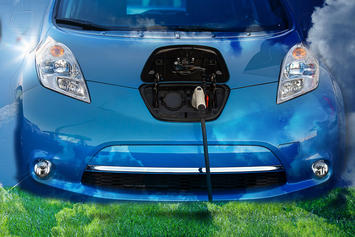
For years the EV’s owners have benefitted from Federal subsidies (financed by the working class) and have been exempt from the fuel taxes that pay for road and bridge maintenance as they use no “fuel” as it relates to powering a combustion engine.
Things are changing and rather quickly. With subsidies beginning to end, states are also hitting electric vehicle owners with high fees in an effort to put all vehicles equally accountable for financing repairs and maintenance of our highway infrastructure.
The average household income of electric vehicle (EV) purchasers is upwards of $200,000. This subsidy is a burden on American families and disproportionately impacts low-income consumers, who can’t afford to purchase EVs, but are forced to pay for supporting infrastructure while EV owners who enjoy the benefits of that same infrastructure are given a free pass.
As an insult to your personal wallet, Congress is using your tax money to give the wealthy a $7,500 tax credit. Under existing law, buyers of expensive electric cars can get up to $7,500 in tax credits for the purchase of qualifying electric vehicles.
Since drivers of electric vehicles do not purchase gasoline, they do not pay federal gasoline taxes which go into the Highway Trust Fund that pays for federal road maintenance. Again, another burden for the average working family to finance the roads for the elite owners of EVs.
The American Legislative Exchange Council (ALEC) is America’s largest nonpartisan, voluntary membership organization of state legislators dedicated to the principles of limited government, free markets and federalism – the foundations on which our republic was founded. They have a resolution that calls for equalizing the tax treatment of different types of vehicles by supporting the end of the $7,500 federal tax credit for electric vehicles and for adding vehicle registration fees for all electric vehicles regardless of size or specific power delivery structure.
Most transportation funding comes from a consumption tax on gasoline. Obviously, electric vehicles have no consumption that is taxable that makes its way to the Transportation Department. These proposed new fees are a way for electric car owners to pay their fair share for maintaining the roads and bridges they use in the state.
In Missouri, there’s a proposal to increase the existing EV fee to three times what the owner of a gas-powered car would pay next year in the state, and the fee would increase to four times the amount by 2025.
California, where half of all the EVs in the country reside, has been a huge supporter of EV’s and catering to the elite ownership, by being virtually the last state to impose fees on the elite EV owners to help pay for maintaining the roads those heavy EV’s are using.
California has been applying no fees. The State relies on the gasoline fuel used by average working families to pay for maintaining the roads that EV’s use. This will finally come to an end in 2020!! Those vehicles will incur a one-time $100 registration fee upfront, followed by an annual registration fee that varies based on the market value of the vehicle.
California needs to move its 35 million registered vehicles through its transportation infrastructure. Facing rising congestion in the freeway toll lanes, the Metropolitan Transportation Authority (MTA) wants to end free rides for commuters who drive alone in zero-emission vehicles in toll lanes. The policy is one of several that Metro is pursuing to keep speeds in the lanes above the federally mandated minimum of 45 mph during rush hour.
The public is quickly learning that EV’s are not as eco-friendly as has been advertised. If e-cars are running on electricity produced by burning dirty fossil fuels, their highly touted climate benefits are limited. Because of the complex batteries they use, it currently takes more energy to mine and produce the exotic minerals of lithium and cobalt for an electric car than a conventional one. And, disposing of those batteries creates an environmental hazard.
More and more folks are learning about the very dark side of the environmental atrocities and the non-existing transparency of human rights abuses associated with mining for the exotic minerals that power the EV’s.
Under present conditions, the overall carbon footprint of a battery-powered car "is similar to that of a conventional car with a combustion engine, regardless of its size." That's the conclusion of a 2011 study by the Institute for Energy and Environmental Research (IFEU) in Heidelberg. While less emissions are produced by the cars themselves while driving on the streets, CO2 is still being emitted by power plants to charge the electric cars, and the enormous emission resulting from the mining of those exotic minerals in countries with negligible environmental controls.
The same people that want the world to go green are contradicting their emotions with their procurement of larger, and less fuel efficient, SUV’s and pickup trucks. More than 17 million cars were sold in 2017. Two-thirds of them were SUVs and pickup trucks. So the US auto industry is in a weird spot, simultaneously betting on electric vehicles and SUVs.
Working class people, you can shout hallelujah and clap your hands. With the $7,500 subsidies starting to disappear and the inclusion of the EV’s contributing to maintenance of the roads they use; the free lunch provided by your tax dollars is finally coming to an end.
This article first appeared at CFACT.
Ronald Stein, P.E. is the Founder and Ambassador for Energy & Infrastructure at PTS Advance.












